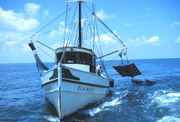Fishery

Generally, a fishery is an entity engaged in raising and/or harvesting fish, which is determined by some authority to be a fishery.[1] According to the FAO, a fishery is typically defined in terms of the "people involved, species or type of fish, area of water or seabed, method of fishing, class of boats, purpose of the activities or a combination of the foregoing features".[2] The definition often includes a combination of fish and fishers in a region, the latter fishing for similar species with similar gear types.[3]
A fishery may involve the capture of wild fish or raising fish through fish farming or aquaculture.[2][4] Directly or indirectly, the livelihood of over 500 million people in developing countries depends on fisheries and aquaculture. Overfishing, or taking of fish beyond sustainable levels, is reducing fish stocks and employment in many world regions.[5][6]
Contents |
The term "fish"
- In biology – the term fish is most strictly used to describe any animal with a backbone that has gills throughout life and has limbs, if any, in the shape of fins.[7] Many types of aquatic animals commonly referred to as fish are not fish in this strict sense; examples include shellfish, cuttlefish, starfish, crayfish and jellyfish. In earlier times, even biologists did not make a distinction - sixteenth century natural historians classified also seals, whales, amphibians, crocodiles, even hippopotamuses, as well as a host of aquatic invertebrates, as fish.[8]
- In fisheries – the term fish is used as a collective term, and includes mollusks, crustaceans and any aquatic animal which is harvested.[2] The strict biological definition of a fish, above, is sometimes called a true fish. True fish are also referred to as finfish or fin fish to distinguish them from other aquatic life harvested in fisheries or aquaculture.
Types
Fisheries are harvested for their value (commercial, recreational or subsistence). They can be saltwater or freshwater, wild or farmed. Examples are the salmon fishery of Alaska, the cod fishery off the Lofoten islands, the tuna fishery of the Eastern Pacific, or the shrimp farm fisheries in China. Capture fisheries can be broadly classified as industrial scale, small-scale or artisanal, and recreational.
Close to 90% of the world’s fishery catches come from oceans and seas, as opposed to inland waters. Marine catches are in catastrophic decline as wild farming techniques have fast outpaced the ability of natural systems to recover from high-tech onslaughts == References ==* Butchart, S.H.M. (2010). "Global biodiversity: Indicators of recent declines". Science (New York, N.Y.) (0036-8075), 328 (5982), p. 1164.
}}</ref> Most marine fisheries are based near the coast. This is not only because harvesting from relatively shallow waters is easier than in the open ocean, but also because fish are much more abundant near the coastal shelf, due to coastal upwelling and the abundance of nutrients available there. However, productive wild fisheries also exist in open oceans, particularly by seamounts, and inland in lakes and rivers.
Most fisheries are wild fisheries, but increasingly fisheries are farmed. Farming can occur in coastal areas, such as with oyster farms,[9] but more typically occur inland, in lakes, ponds, tanks and other enclosures.
There are species fisheries worldwide for finfish, mollusks and crustaceans, and by extension, aquatic plants such as kelp. However, a very small number of species support the majority of the world’s fisheries. Some of these species are herring, cod, anchovy, tuna, flounder, mullet, squid, shrimp, salmon, crab, lobster, oyster and scallops. All except these last four provided a worldwide catch of well over a million tonnes in 1999, with herring and sardines together providing a harvest of over 22 million metric tons in 1999. Many other species are harvested in smaller numbers.
Currently, fisheries worldwide are considered to be in crisis with a massive overharvest,economic ineffeciencies, bad management, massive bycatch, environmental damage and scientific inadequacy attributed to the present catastrophic depletion of stocks. == References ==
- Cullis-Suzuki, S., Pauly, D.(2010). " Failing the high seas: A global evaluation of regional fisheries management organizations", Marine Policy, 34(5).
pp 1036-1042.
See also
- Aquatic ecosystem
- Fish farming
- Fisheries management
- Fisheries science
- National Fish Habitat Initiative
- Wild fisheries
- Ocean fisheries
- Overfishing
- Population dynamics of fisheries
- Sea Fish Industry Authority
- Regional Fisheries Management Organisation
Notes
- ↑ Fletcher, WJ; Chesson, J; Fisher, M; Sainsbury KJ; Hundloe, T; Smith, ADM and Whitworth, B (2002) The "How To" guide for wild capture fisheries. National ESD reporting framework for Australian fisheries: FRDC Project 2000/145. Page 119–120.
- ↑ 2.0 2.1 2.2 FAO: Fisheries glossary
- ↑ Madden, CJ and Grossman, DH (2004) A Framework for a Coastal/Marine Ecological Classification Standard. NatureServe, page 86. Prepared for NOAA under Contract EA-133C-03-SE-0275
- ↑ NOAA: Fisheries glossary p. 24.
- ↑ C.Michael Hogan (2010) Overfishing, Encyclopedia of earth, topic ed. Sidney Draggan, ed. in chief C. Cleveland, National Council on Science and the Environment (NCSE), Washington DC
- ↑ Fisheries and Aquaculture in our Changing Climate Policy brief of the FAO for the UNFCCC COP-15 in Copenhagen, December 2009.
- ↑ Nelson, Joseph S. (2006). Fishes of the World. John Wiley & Sons, Inc.. pp. 2. ISBN 0471250317.
- ↑ Jr.Cleveland P Hickman, Larry S. Roberts, Allan L. Larson: Integrated Principles of Zoology, McGraw-Hill Publishing Co, 2001, ISBN 0–07–290961–7
- ↑ New Zealand Seafood Industry Council. Mussel Farming.
References
- FAO: Types of fisheries
- Hart PJB and Reynolds JD (2002) Handbook of fish biology and fisheries Wiley-Blackwell. ISBN 9780632054121
External links
- Fisheries at the Open Directory Project
- FAO Fisheries Department and its SOFIA report
- The Fishery Resources Monitoring System (FIRMS)
- The International Institute of Fisheries Economics and Trade (IIFET)
- Dynamic Changes in Marine Ecosystems: Fishing, Food Webs, and Future Options (2006), U.S. National Academy of Sciences
- UNEP/GEF South China Sea Project and its Fisheries Refugia Portal and National Reports on Fish Stocks and Habitats in the South China Sea
|
|||||||||||||||||||||||||||||
|
|||||||||||||||||||||||||||||||||||||


.png)
